Ecological succession is the gradual
process by which ecosystems change and develop over time.
For example, a bare patch of ground will not stay bare.
It will rapidly be colonized by a variety of plants.
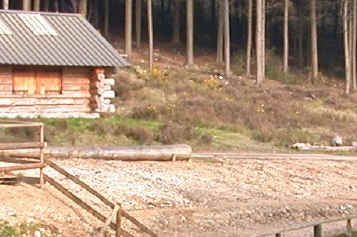 |
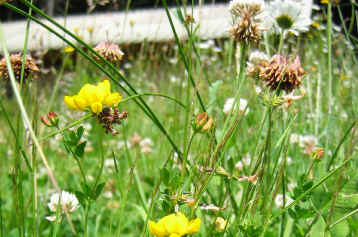 |
A recently cleared patch of ground (in Britain). |
The
same ground 2 years later,
now covered in grasses and low flowering plants. |
In the process of succession, the species present in an
area will gradually change.
Succession takes place because the environmental
conditions in a particular place change over time. Each species is adapted to thrive and
compete best against other species under a very specific set of environmental conditions.
If these conditions change, then the existing species will be replaced by a new set of
species which are better adapted to the new conditions.
As an example, the environmental conditions present on
the bare patch of ground above would have been quite different 2 years later. Some of
these differences are highlighted below.
| Bare Ground |
Two
Years Later |
No plant competition for light, space,
nutrients or water.
Soil mobile and liable to erosion and
loss.
A more extreme surface microclimate
because the bare soil both absorbs and reflects heat more than soil covered in vegetation.
A drier environment because there is no plant cover to hold moisture above ground and
little humus to hold it in the soil.
Lower nutrient levels in the soil. |
Intense plant competition for space and
other resources.
Soil bound by roots and plant cover.
The plant cover provides a certain
amount of ground insulation from extremes of temperature. There are now also a variety of
microclimates within the vegetation.
Plant cover and increasing humus levels
help to retain water.
The nutrient levels in the soil will have increased.
|
The bare ground conditions favour pioneer
plant species. These are often species which grow best where there is little competition
for space and resources.
 |
Mosses are often pioneer
species. Most moss species are low growing, carpeting the ground and with little height.
As a result of this growth form, many mosses are unable to successfully compete for space
amongst taller, dense ground cover. This makes bare ground
ideal for the establishment of a number of different moss species. These mosses then
provide a microhabitat equivalent to a miniature forest for a variety of invertebrates
such as mites and spiders. The moss also acts like a sponge when wet, in some cases
providing a semi-aquatic microhabitat. |
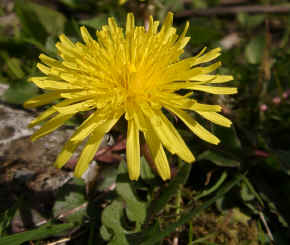 |
Pioneer
species are often also 'opportunist' species which are able to rapidly exploit a sudden
new opening in ground plant cover.
Left: Dandelion
Typical examples in the UK would be dandelion, Foxglove and
willowherb.
Seeds arrive, germinate and grow quickly, rapidly reproducing
themselves before other slower-colonizing species arrive to outcompete them.
Along with the plants will come the animals which feed on them or
use them for shelter.
Left: Bee on Foxglove |
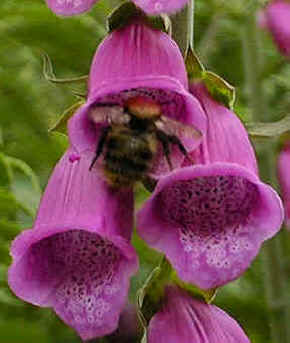 |
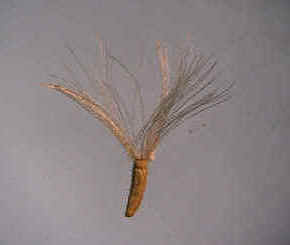 |
Pioneer species are often characterized by having light
seeds, which are easily transported by the wind. Many of them belong to the flowering
plant family 'Compositae' Such plants produce large numbers of
seeds with parachutes of fine hairs which help to keep them afloat in air currents.
(Left: Ragwort seed) |
Continue |





